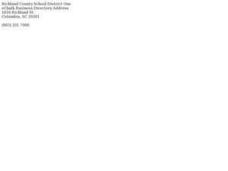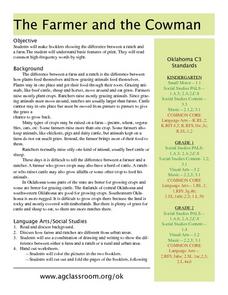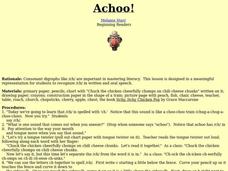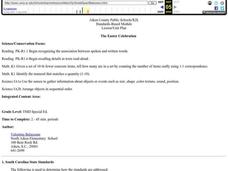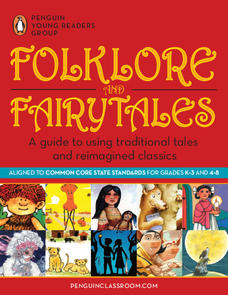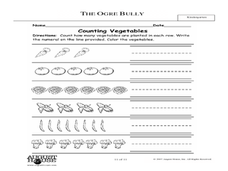Curated OER
Are Chickens Really "Chicken"?
Learners practice their reading comprehension skills by reading about chickens. They state the characteristics of chickens and examine how growing up on a farm and being in the wild is different for the chickens.
Curated OER
Interrupting Chicken
Students read the book Interrupting Chicken about someone who keeps interrupting. In this reading lesson plan, students discuss how they should not interrupt in class.
Curated OER
Hatching chickens
Learners recognize the need for gentle care of eggs. In this chicken hatching instructional activity, students observe the process of incubating eggs for hatching. Learners find the materials needed to properly care for the chicks....
Curated OER
Poultry in Motion (The Little Red Hen Meets Chicken Little)
Students read stories and use reading and writing skills to sequence, compare and contrast, predict, and identify parts of a story. Six lessons on one page.
Curated OER
Barnyard Protest: Cows, Chickens & Fundamental Freedoms
Here is an ambitious and engaging lesson that should help elementary schoolers begin to develop a basic understanding of human rights. Pupils are asked to think about their own rights, the rights of others, and how an individual's voice...
Curated OER
Jogging Chicken Dance
Students engage in a light cardiovascular instant activity while actively listening for audible cues.
Curated OER
Hatched From An Egg
Students discover how animals are born/hatched. In this life science instructional activity, students listen to a book entitled Chickens Aren't The Only Ones, and discuss animals that are hatched or born. Students receive a picture of...
Curated OER
The Farmer and the Cowman
What is the difference between a ranch and a farm? After reading and discussing the provided background information, young agriculturalists will color, cut, and create neat little booklets that show the differences between ranches and...
Curated OER
Achoo!
Young scholars examine the /ch/ digraph using a tongue twister and Grace Maccarone's poem, "Itchy, Itchy, Chicken Pox." They recite the tongue twister, write the letters, and imitate a sneeze each time they hear the /ch/ while the...
Curated OER
Piggie Pie!
Students explain about their experiences on the farm and draw pictures to show what they know. Students read the recipe for the piggie pie that Gritch was going to use. Students estimate and then measure how many pigs it would take to...
Curated OER
The Easter Celebration
Students read a short story about Easter. They recognize and point to pictures of the key words (egg, chicken, rabbit, basket, flower). They make an Easter basket and count how many chickens can fit inside. They also practice identifying...
Curated OER
Comprehension Skills: Evaluate Using Fiction Stories and Aesop's Fables
Primary readers investigate several comprehension skills in the ten lessons of this unit. Forming opinions about stories, comparing stories to each other, using Venn Diagrams, and applying the ideas from a story to real life situations...
August House
The Ogre Bully
English language arts, math, science, dramatic arts, and cooking; this lesson plan has it all! In this multidisciplinary resource, your scholars will take part in a read aloud of The Ogre Bully by A.B. Hoffmire and have a grand...
Penguin Books
Folklore and Fairytales: A Guide to Using Traditional Tales and Reimagined Classics
Every culture has its own stories to tell. An interesting educator's guide shares a large collection of fairytales and folktales, some from different cultures and some re-creations of classics. A summary and brief teaching ideas...
Curated OER
Holy Mole
Students discover Mexican culture by reading and cooking. In this Central American History lesson plan, students read the book Holy Mole, and analyze the story by answering questions about plot, characters and even sound effects they...
Curated OER
Stone Soup
Students create a list of ingredients after counting the ingredients in Stone Soup.
Curated OER
Introduce Vocabulary: The Emperor's Egg
Students examine vocabulary words. In this language arts instructional activity, students listen to The Emperor's Egg. Students discuss the meanings of the vocabulary words and use them in sentences.
Curated OER
Activity Plan 2-3: Baby Animals
Learners get to be creative in learning about baby animals. In this early childhood lesson plan, students develop fine motor, math, and science skills as they sing, read, and share about baby animals.
Curated OER
The Ogre Bully Lesson
Students investigate bullies, agriculture and cooking by completing worksheets about a book they read. In this story analysis lesson, students read the story The Ogre Bully, and discuss bullying as well as farming with their classmates....
Curated OER
Get Cracking
Pupils compare the life cycle of an animal hatched from an egg with one born from its mother's womb. The lesson focuses on dinosaur eggs. They create dinosaur eggs from balloons and papier mache.
Curated OER
Goodness! Gorillas in Our Community!
Students discuss the story Goodness! Gorillas in Our Community! and create character maps from it. They practice qualities of community membership and write about and illustrate these qualities.
Curated OER
What Is A Dinosaur?
Students use the question of "What is a dinosaur?" in order to establish the context for a class investigation. They use a variety of resources in order to gather information. Students compare and contrast the similarities or differences...
Other popular searches
- Sequencing Chicken Little
- Chicken Little Puppets
- Chicken Little Literacy
- Chicken Little Movie
- Chicken Little Maths
- Chicken Little Play
- Chicken Little Play Costume
- The Little Yellow Chicken
- Chicken Little Lesson Plans
- Good Bye, Chicken Little
- Chicken Little Worksheet
- Little Yellow Chicken








